Economic Assignment: Policy Analysis of Vehicle Emission Ban in France
VerifiedAdded on 2020/05/08
|11
|1911
|73
Essay
AI Summary
This economics assignment examines France's policy to ban petrol and diesel vehicles by 2040, analyzing the economic implications and market dynamics. The assignment explores the concept of market failure, specifically negative externalities arising from air pollution caused by fossil fuel emissions, and how this leads to inefficient market outcomes. It details the French government's intervention, including incentives for electric vehicle adoption and investments in energy efficiency, and assesses the policy's impact on the car market, particularly the rise of electric vehicles and related complementary markets like battery production and charging infrastructure. The analysis considers the policy's effects on both the petrol/diesel car market and the emerging electric car market, illustrating shifts in demand and the need for infrastructure development. The assignment also touches on the need for renewable energy sources like wind and nuclear power to support the transition. The conclusion reinforces the role of government intervention in correcting market failures and promoting public health through climate action.
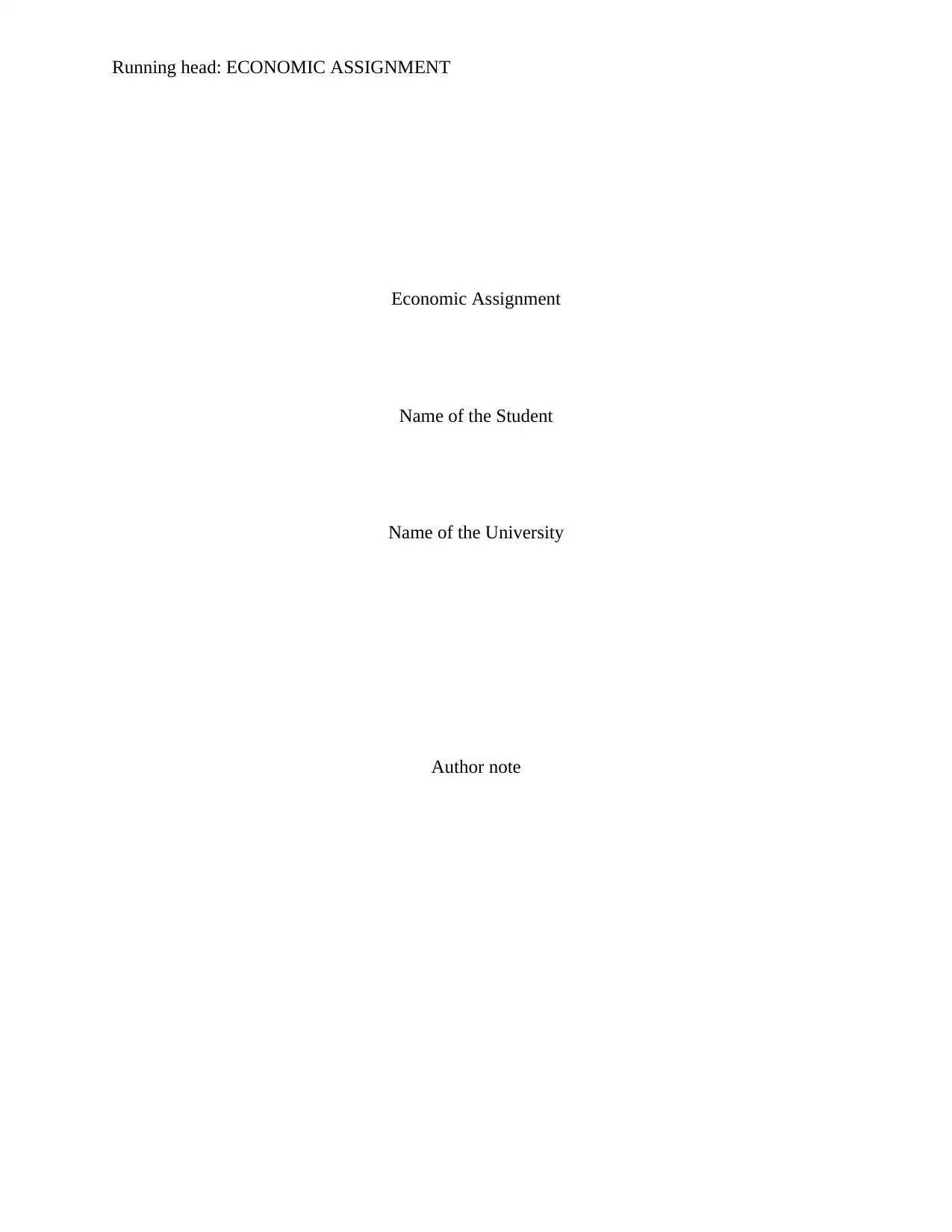
Running head: ECONOMIC ASSIGNMENT
Economic Assignment
Name of the Student
Name of the University
Author note
Economic Assignment
Name of the Student
Name of the University
Author note
Paraphrase This Document
Need a fresh take? Get an instant paraphrase of this document with our AI Paraphraser
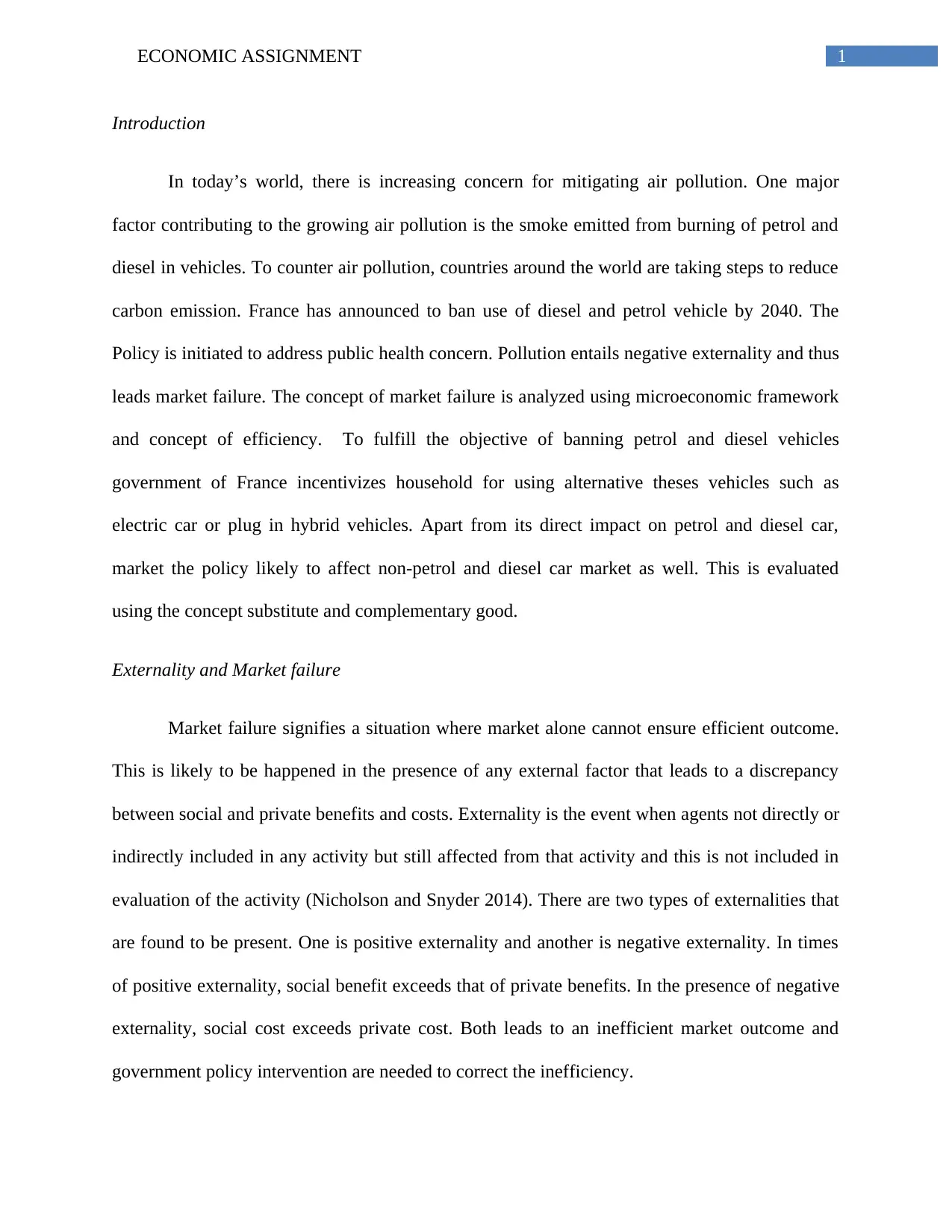
1ECONOMIC ASSIGNMENT
Introduction
In today’s world, there is increasing concern for mitigating air pollution. One major
factor contributing to the growing air pollution is the smoke emitted from burning of petrol and
diesel in vehicles. To counter air pollution, countries around the world are taking steps to reduce
carbon emission. France has announced to ban use of diesel and petrol vehicle by 2040. The
Policy is initiated to address public health concern. Pollution entails negative externality and thus
leads market failure. The concept of market failure is analyzed using microeconomic framework
and concept of efficiency. To fulfill the objective of banning petrol and diesel vehicles
government of France incentivizes household for using alternative theses vehicles such as
electric car or plug in hybrid vehicles. Apart from its direct impact on petrol and diesel car,
market the policy likely to affect non-petrol and diesel car market as well. This is evaluated
using the concept substitute and complementary good.
Externality and Market failure
Market failure signifies a situation where market alone cannot ensure efficient outcome.
This is likely to be happened in the presence of any external factor that leads to a discrepancy
between social and private benefits and costs. Externality is the event when agents not directly or
indirectly included in any activity but still affected from that activity and this is not included in
evaluation of the activity (Nicholson and Snyder 2014). There are two types of externalities that
are found to be present. One is positive externality and another is negative externality. In times
of positive externality, social benefit exceeds that of private benefits. In the presence of negative
externality, social cost exceeds private cost. Both leads to an inefficient market outcome and
government policy intervention are needed to correct the inefficiency.
Introduction
In today’s world, there is increasing concern for mitigating air pollution. One major
factor contributing to the growing air pollution is the smoke emitted from burning of petrol and
diesel in vehicles. To counter air pollution, countries around the world are taking steps to reduce
carbon emission. France has announced to ban use of diesel and petrol vehicle by 2040. The
Policy is initiated to address public health concern. Pollution entails negative externality and thus
leads market failure. The concept of market failure is analyzed using microeconomic framework
and concept of efficiency. To fulfill the objective of banning petrol and diesel vehicles
government of France incentivizes household for using alternative theses vehicles such as
electric car or plug in hybrid vehicles. Apart from its direct impact on petrol and diesel car,
market the policy likely to affect non-petrol and diesel car market as well. This is evaluated
using the concept substitute and complementary good.
Externality and Market failure
Market failure signifies a situation where market alone cannot ensure efficient outcome.
This is likely to be happened in the presence of any external factor that leads to a discrepancy
between social and private benefits and costs. Externality is the event when agents not directly or
indirectly included in any activity but still affected from that activity and this is not included in
evaluation of the activity (Nicholson and Snyder 2014). There are two types of externalities that
are found to be present. One is positive externality and another is negative externality. In times
of positive externality, social benefit exceeds that of private benefits. In the presence of negative
externality, social cost exceeds private cost. Both leads to an inefficient market outcome and
government policy intervention are needed to correct the inefficiency.
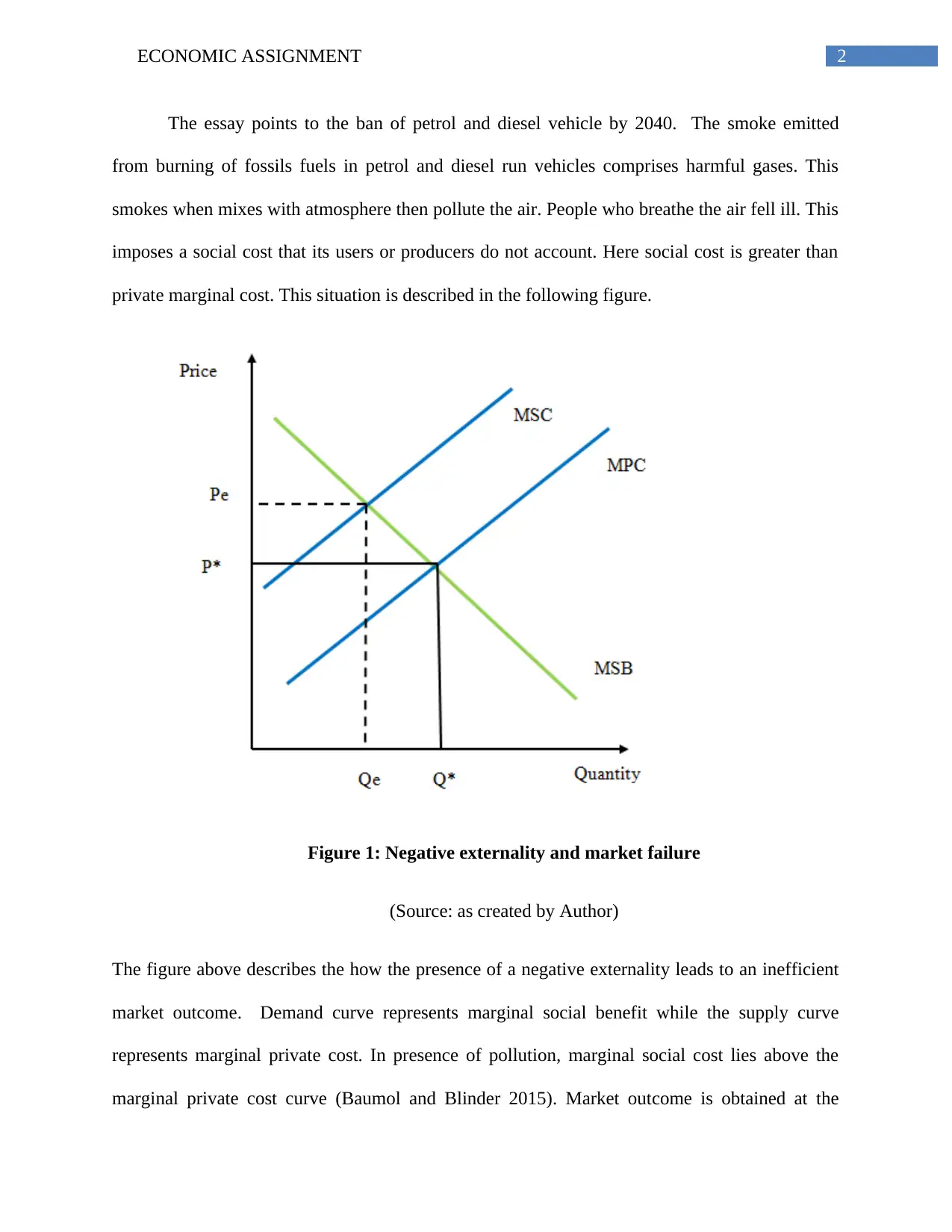
2ECONOMIC ASSIGNMENT
The essay points to the ban of petrol and diesel vehicle by 2040. The smoke emitted
from burning of fossils fuels in petrol and diesel run vehicles comprises harmful gases. This
smokes when mixes with atmosphere then pollute the air. People who breathe the air fell ill. This
imposes a social cost that its users or producers do not account. Here social cost is greater than
private marginal cost. This situation is described in the following figure.
Figure 1: Negative externality and market failure
(Source: as created by Author)
The figure above describes the how the presence of a negative externality leads to an inefficient
market outcome. Demand curve represents marginal social benefit while the supply curve
represents marginal private cost. In presence of pollution, marginal social cost lies above the
marginal private cost curve (Baumol and Blinder 2015). Market outcome is obtained at the
The essay points to the ban of petrol and diesel vehicle by 2040. The smoke emitted
from burning of fossils fuels in petrol and diesel run vehicles comprises harmful gases. This
smokes when mixes with atmosphere then pollute the air. People who breathe the air fell ill. This
imposes a social cost that its users or producers do not account. Here social cost is greater than
private marginal cost. This situation is described in the following figure.
Figure 1: Negative externality and market failure
(Source: as created by Author)
The figure above describes the how the presence of a negative externality leads to an inefficient
market outcome. Demand curve represents marginal social benefit while the supply curve
represents marginal private cost. In presence of pollution, marginal social cost lies above the
marginal private cost curve (Baumol and Blinder 2015). Market outcome is obtained at the
⊘ This is a preview!⊘
Do you want full access?
Subscribe today to unlock all pages.

Trusted by 1+ million students worldwide
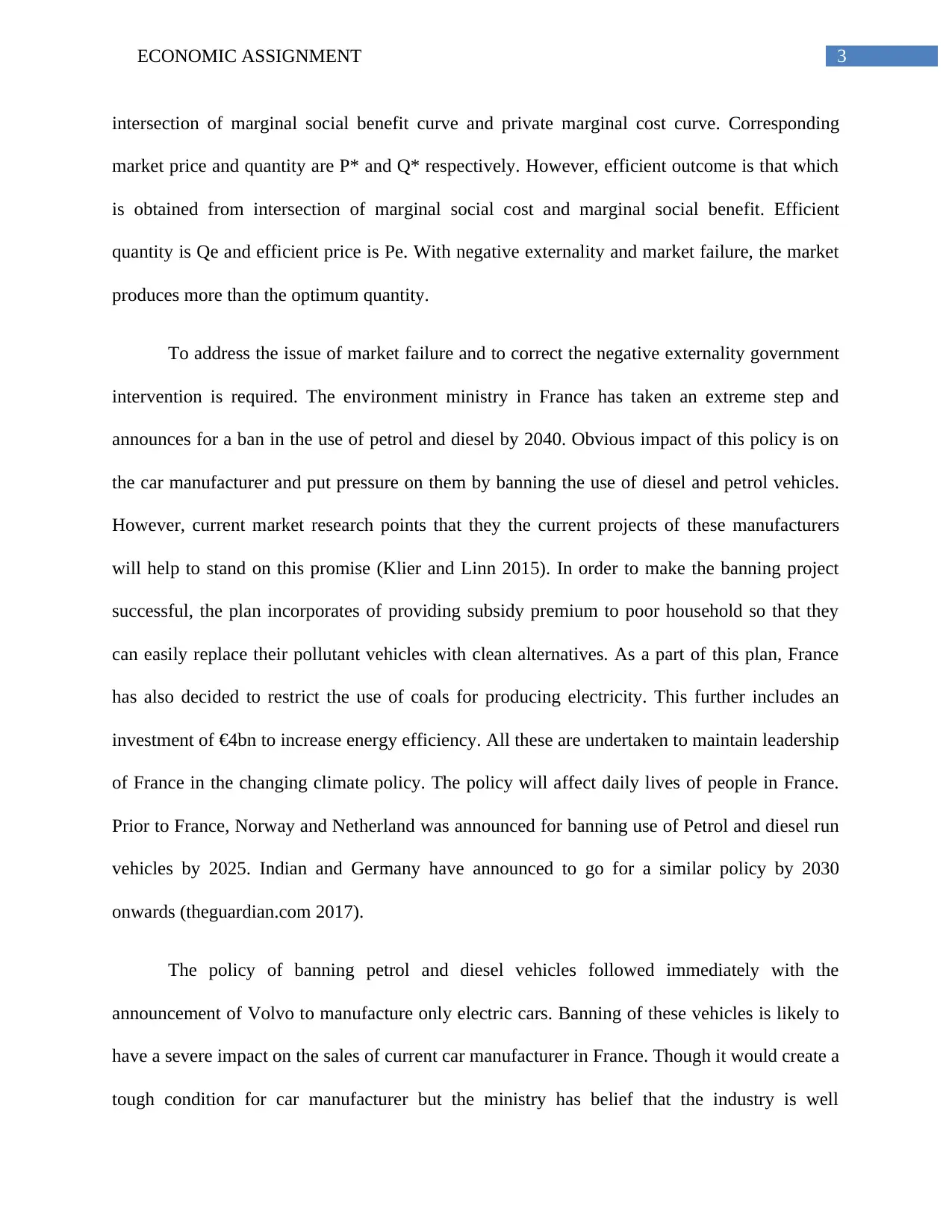
3ECONOMIC ASSIGNMENT
intersection of marginal social benefit curve and private marginal cost curve. Corresponding
market price and quantity are P* and Q* respectively. However, efficient outcome is that which
is obtained from intersection of marginal social cost and marginal social benefit. Efficient
quantity is Qe and efficient price is Pe. With negative externality and market failure, the market
produces more than the optimum quantity.
To address the issue of market failure and to correct the negative externality government
intervention is required. The environment ministry in France has taken an extreme step and
announces for a ban in the use of petrol and diesel by 2040. Obvious impact of this policy is on
the car manufacturer and put pressure on them by banning the use of diesel and petrol vehicles.
However, current market research points that they the current projects of these manufacturers
will help to stand on this promise (Klier and Linn 2015). In order to make the banning project
successful, the plan incorporates of providing subsidy premium to poor household so that they
can easily replace their pollutant vehicles with clean alternatives. As a part of this plan, France
has also decided to restrict the use of coals for producing electricity. This further includes an
investment of €4bn to increase energy efficiency. All these are undertaken to maintain leadership
of France in the changing climate policy. The policy will affect daily lives of people in France.
Prior to France, Norway and Netherland was announced for banning use of Petrol and diesel run
vehicles by 2025. Indian and Germany have announced to go for a similar policy by 2030
onwards (theguardian.com 2017).
The policy of banning petrol and diesel vehicles followed immediately with the
announcement of Volvo to manufacture only electric cars. Banning of these vehicles is likely to
have a severe impact on the sales of current car manufacturer in France. Though it would create a
tough condition for car manufacturer but the ministry has belief that the industry is well
intersection of marginal social benefit curve and private marginal cost curve. Corresponding
market price and quantity are P* and Q* respectively. However, efficient outcome is that which
is obtained from intersection of marginal social cost and marginal social benefit. Efficient
quantity is Qe and efficient price is Pe. With negative externality and market failure, the market
produces more than the optimum quantity.
To address the issue of market failure and to correct the negative externality government
intervention is required. The environment ministry in France has taken an extreme step and
announces for a ban in the use of petrol and diesel by 2040. Obvious impact of this policy is on
the car manufacturer and put pressure on them by banning the use of diesel and petrol vehicles.
However, current market research points that they the current projects of these manufacturers
will help to stand on this promise (Klier and Linn 2015). In order to make the banning project
successful, the plan incorporates of providing subsidy premium to poor household so that they
can easily replace their pollutant vehicles with clean alternatives. As a part of this plan, France
has also decided to restrict the use of coals for producing electricity. This further includes an
investment of €4bn to increase energy efficiency. All these are undertaken to maintain leadership
of France in the changing climate policy. The policy will affect daily lives of people in France.
Prior to France, Norway and Netherland was announced for banning use of Petrol and diesel run
vehicles by 2025. Indian and Germany have announced to go for a similar policy by 2030
onwards (theguardian.com 2017).
The policy of banning petrol and diesel vehicles followed immediately with the
announcement of Volvo to manufacture only electric cars. Banning of these vehicles is likely to
have a severe impact on the sales of current car manufacturer in France. Though it would create a
tough condition for car manufacturer but the ministry has belief that the industry is well
Paraphrase This Document
Need a fresh take? Get an instant paraphrase of this document with our AI Paraphraser
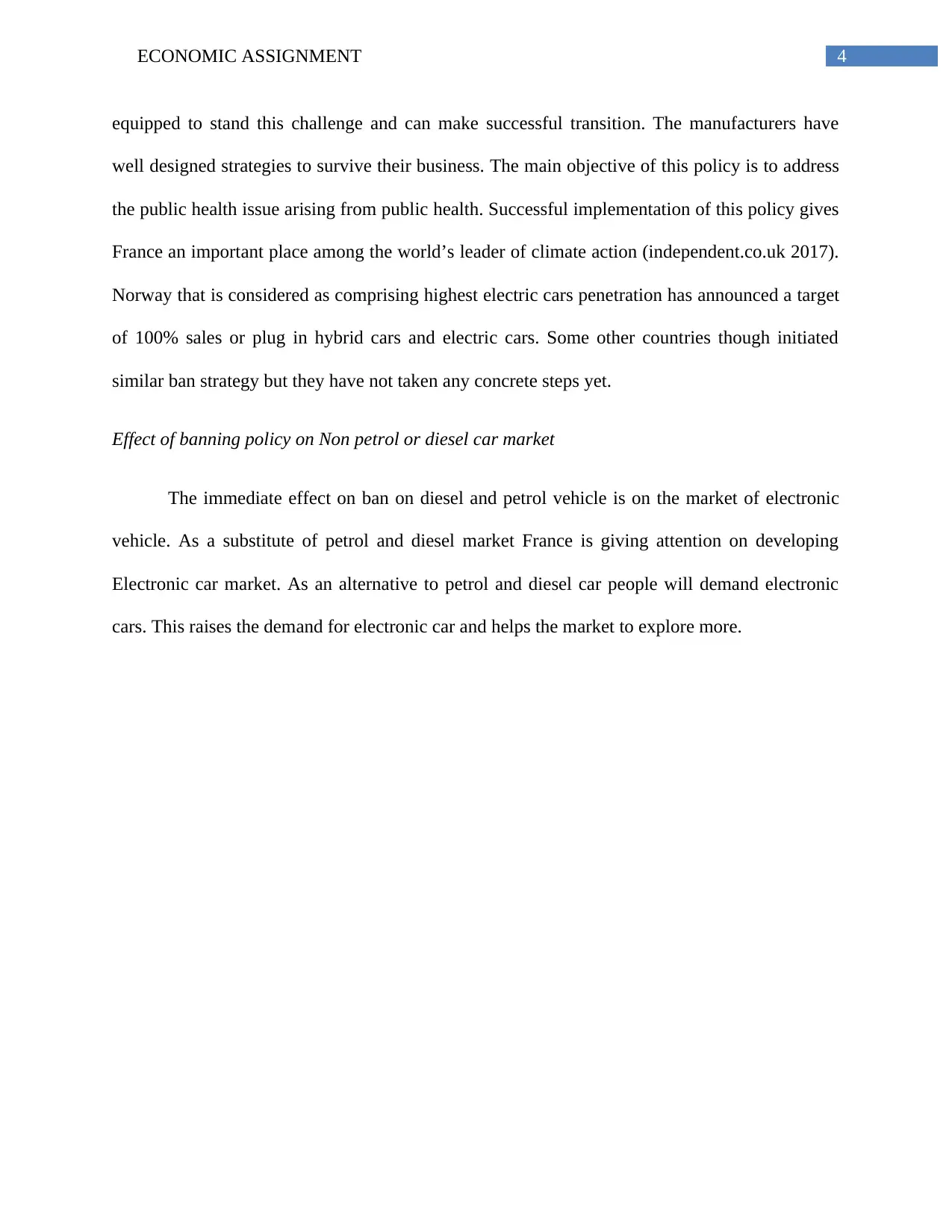
4ECONOMIC ASSIGNMENT
equipped to stand this challenge and can make successful transition. The manufacturers have
well designed strategies to survive their business. The main objective of this policy is to address
the public health issue arising from public health. Successful implementation of this policy gives
France an important place among the world’s leader of climate action (independent.co.uk 2017).
Norway that is considered as comprising highest electric cars penetration has announced a target
of 100% sales or plug in hybrid cars and electric cars. Some other countries though initiated
similar ban strategy but they have not taken any concrete steps yet.
Effect of banning policy on Non petrol or diesel car market
The immediate effect on ban on diesel and petrol vehicle is on the market of electronic
vehicle. As a substitute of petrol and diesel market France is giving attention on developing
Electronic car market. As an alternative to petrol and diesel car people will demand electronic
cars. This raises the demand for electronic car and helps the market to explore more.
equipped to stand this challenge and can make successful transition. The manufacturers have
well designed strategies to survive their business. The main objective of this policy is to address
the public health issue arising from public health. Successful implementation of this policy gives
France an important place among the world’s leader of climate action (independent.co.uk 2017).
Norway that is considered as comprising highest electric cars penetration has announced a target
of 100% sales or plug in hybrid cars and electric cars. Some other countries though initiated
similar ban strategy but they have not taken any concrete steps yet.
Effect of banning policy on Non petrol or diesel car market
The immediate effect on ban on diesel and petrol vehicle is on the market of electronic
vehicle. As a substitute of petrol and diesel market France is giving attention on developing
Electronic car market. As an alternative to petrol and diesel car people will demand electronic
cars. This raises the demand for electronic car and helps the market to explore more.
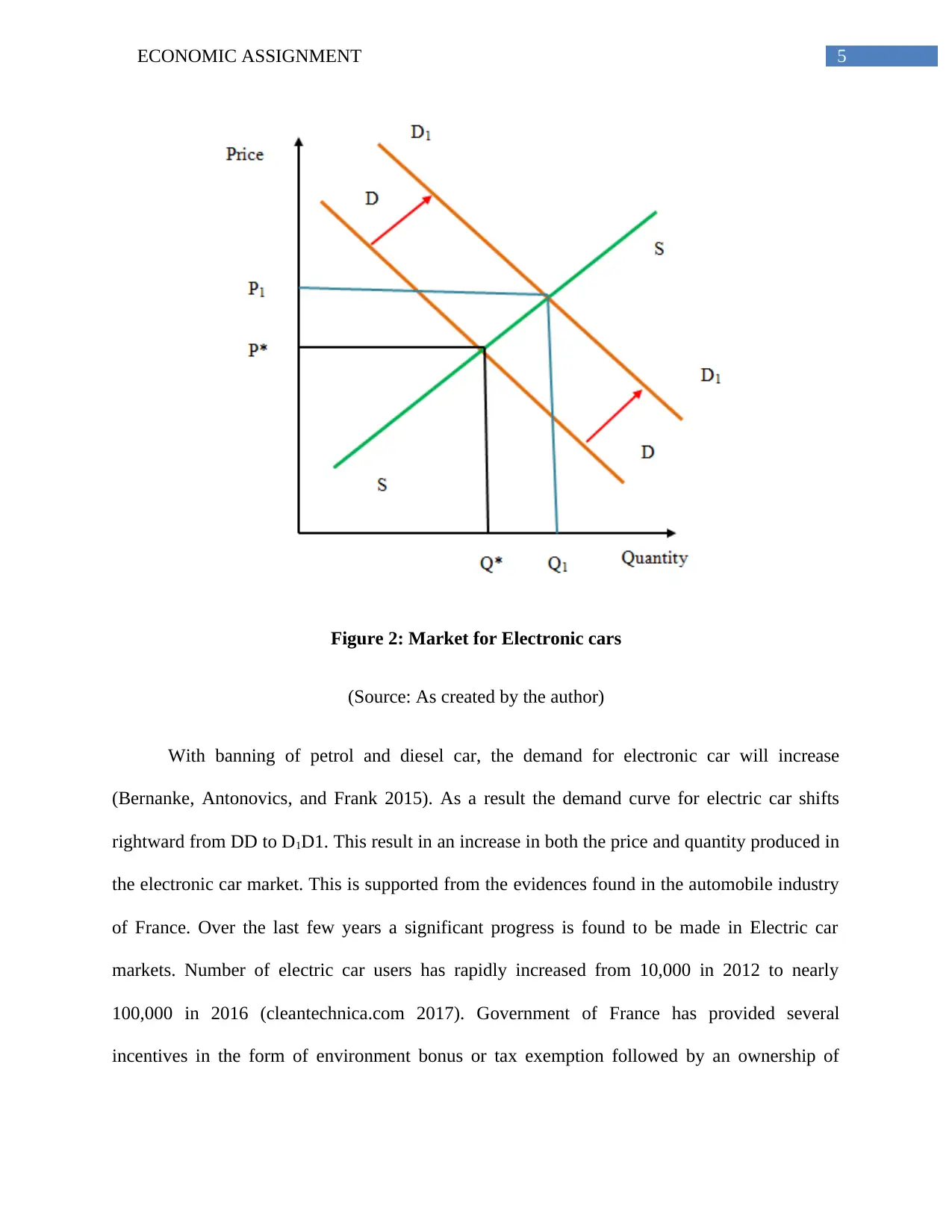
5ECONOMIC ASSIGNMENT
Figure 2: Market for Electronic cars
(Source: As created by the author)
With banning of petrol and diesel car, the demand for electronic car will increase
(Bernanke, Antonovics, and Frank 2015). As a result the demand curve for electric car shifts
rightward from DD to D1D1. This result in an increase in both the price and quantity produced in
the electronic car market. This is supported from the evidences found in the automobile industry
of France. Over the last few years a significant progress is found to be made in Electric car
markets. Number of electric car users has rapidly increased from 10,000 in 2012 to nearly
100,000 in 2016 (cleantechnica.com 2017). Government of France has provided several
incentives in the form of environment bonus or tax exemption followed by an ownership of
Figure 2: Market for Electronic cars
(Source: As created by the author)
With banning of petrol and diesel car, the demand for electronic car will increase
(Bernanke, Antonovics, and Frank 2015). As a result the demand curve for electric car shifts
rightward from DD to D1D1. This result in an increase in both the price and quantity produced in
the electronic car market. This is supported from the evidences found in the automobile industry
of France. Over the last few years a significant progress is found to be made in Electric car
markets. Number of electric car users has rapidly increased from 10,000 in 2012 to nearly
100,000 in 2016 (cleantechnica.com 2017). Government of France has provided several
incentives in the form of environment bonus or tax exemption followed by an ownership of
⊘ This is a preview!⊘
Do you want full access?
Subscribe today to unlock all pages.

Trusted by 1+ million students worldwide
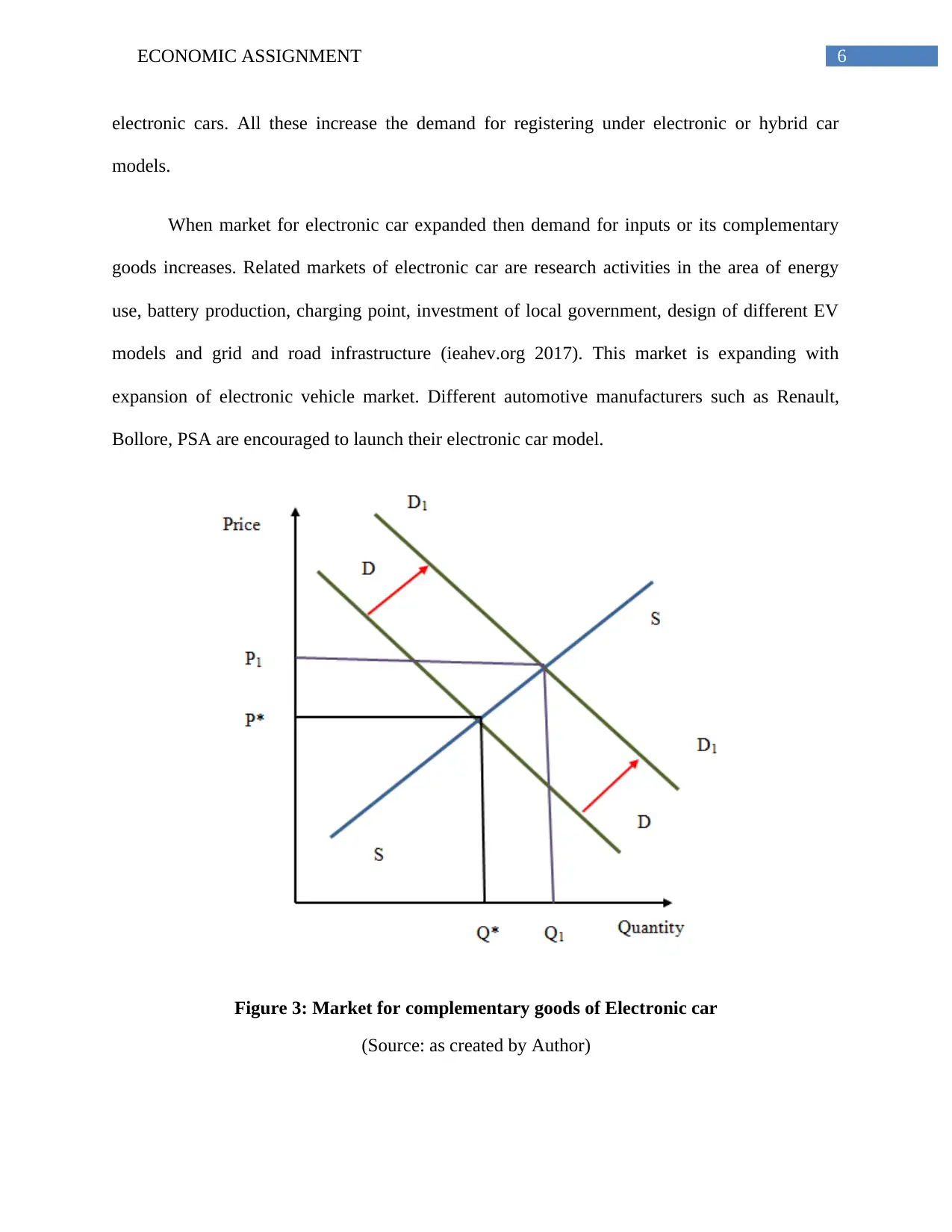
6ECONOMIC ASSIGNMENT
electronic cars. All these increase the demand for registering under electronic or hybrid car
models.
When market for electronic car expanded then demand for inputs or its complementary
goods increases. Related markets of electronic car are research activities in the area of energy
use, battery production, charging point, investment of local government, design of different EV
models and grid and road infrastructure (ieahev.org 2017). This market is expanding with
expansion of electronic vehicle market. Different automotive manufacturers such as Renault,
Bollore, PSA are encouraged to launch their electronic car model.
Figure 3: Market for complementary goods of Electronic car
(Source: as created by Author)
electronic cars. All these increase the demand for registering under electronic or hybrid car
models.
When market for electronic car expanded then demand for inputs or its complementary
goods increases. Related markets of electronic car are research activities in the area of energy
use, battery production, charging point, investment of local government, design of different EV
models and grid and road infrastructure (ieahev.org 2017). This market is expanding with
expansion of electronic vehicle market. Different automotive manufacturers such as Renault,
Bollore, PSA are encouraged to launch their electronic car model.
Figure 3: Market for complementary goods of Electronic car
(Source: as created by Author)
Paraphrase This Document
Need a fresh take? Get an instant paraphrase of this document with our AI Paraphraser
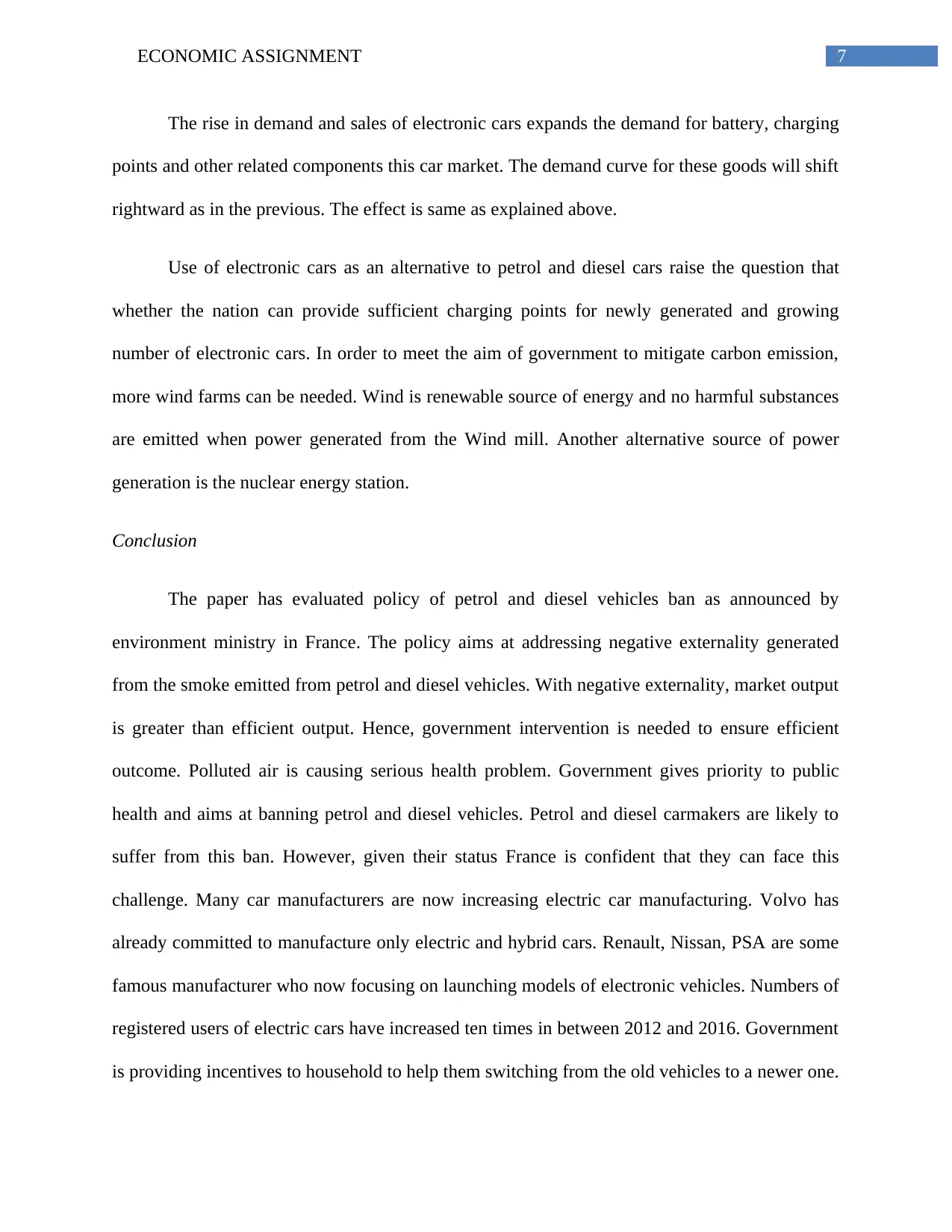
7ECONOMIC ASSIGNMENT
The rise in demand and sales of electronic cars expands the demand for battery, charging
points and other related components this car market. The demand curve for these goods will shift
rightward as in the previous. The effect is same as explained above.
Use of electronic cars as an alternative to petrol and diesel cars raise the question that
whether the nation can provide sufficient charging points for newly generated and growing
number of electronic cars. In order to meet the aim of government to mitigate carbon emission,
more wind farms can be needed. Wind is renewable source of energy and no harmful substances
are emitted when power generated from the Wind mill. Another alternative source of power
generation is the nuclear energy station.
Conclusion
The paper has evaluated policy of petrol and diesel vehicles ban as announced by
environment ministry in France. The policy aims at addressing negative externality generated
from the smoke emitted from petrol and diesel vehicles. With negative externality, market output
is greater than efficient output. Hence, government intervention is needed to ensure efficient
outcome. Polluted air is causing serious health problem. Government gives priority to public
health and aims at banning petrol and diesel vehicles. Petrol and diesel carmakers are likely to
suffer from this ban. However, given their status France is confident that they can face this
challenge. Many car manufacturers are now increasing electric car manufacturing. Volvo has
already committed to manufacture only electric and hybrid cars. Renault, Nissan, PSA are some
famous manufacturer who now focusing on launching models of electronic vehicles. Numbers of
registered users of electric cars have increased ten times in between 2012 and 2016. Government
is providing incentives to household to help them switching from the old vehicles to a newer one.
The rise in demand and sales of electronic cars expands the demand for battery, charging
points and other related components this car market. The demand curve for these goods will shift
rightward as in the previous. The effect is same as explained above.
Use of electronic cars as an alternative to petrol and diesel cars raise the question that
whether the nation can provide sufficient charging points for newly generated and growing
number of electronic cars. In order to meet the aim of government to mitigate carbon emission,
more wind farms can be needed. Wind is renewable source of energy and no harmful substances
are emitted when power generated from the Wind mill. Another alternative source of power
generation is the nuclear energy station.
Conclusion
The paper has evaluated policy of petrol and diesel vehicles ban as announced by
environment ministry in France. The policy aims at addressing negative externality generated
from the smoke emitted from petrol and diesel vehicles. With negative externality, market output
is greater than efficient output. Hence, government intervention is needed to ensure efficient
outcome. Polluted air is causing serious health problem. Government gives priority to public
health and aims at banning petrol and diesel vehicles. Petrol and diesel carmakers are likely to
suffer from this ban. However, given their status France is confident that they can face this
challenge. Many car manufacturers are now increasing electric car manufacturing. Volvo has
already committed to manufacture only electric and hybrid cars. Renault, Nissan, PSA are some
famous manufacturer who now focusing on launching models of electronic vehicles. Numbers of
registered users of electric cars have increased ten times in between 2012 and 2016. Government
is providing incentives to household to help them switching from the old vehicles to a newer one.
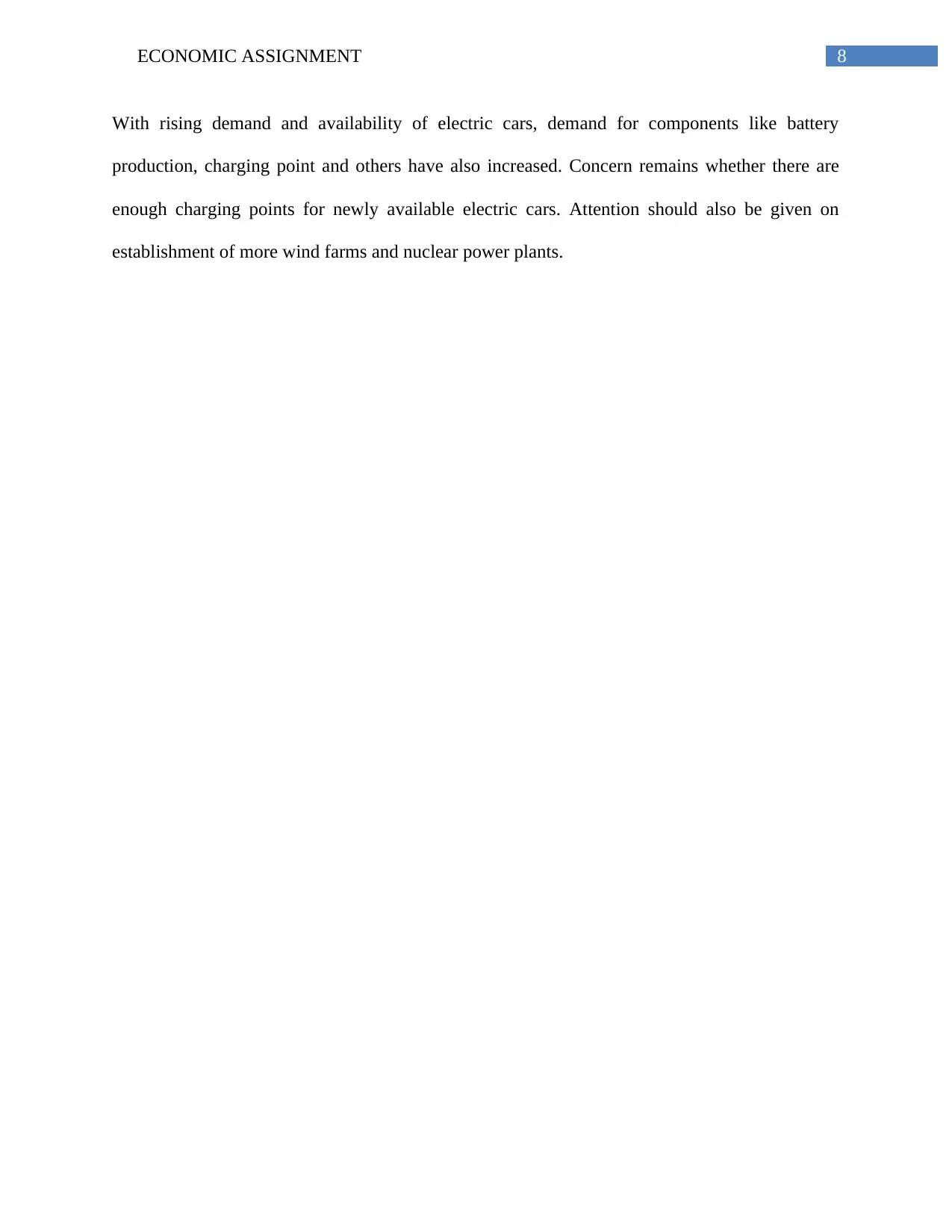
8ECONOMIC ASSIGNMENT
With rising demand and availability of electric cars, demand for components like battery
production, charging point and others have also increased. Concern remains whether there are
enough charging points for newly available electric cars. Attention should also be given on
establishment of more wind farms and nuclear power plants.
With rising demand and availability of electric cars, demand for components like battery
production, charging point and others have also increased. Concern remains whether there are
enough charging points for newly available electric cars. Attention should also be given on
establishment of more wind farms and nuclear power plants.
⊘ This is a preview!⊘
Do you want full access?
Subscribe today to unlock all pages.

Trusted by 1+ million students worldwide
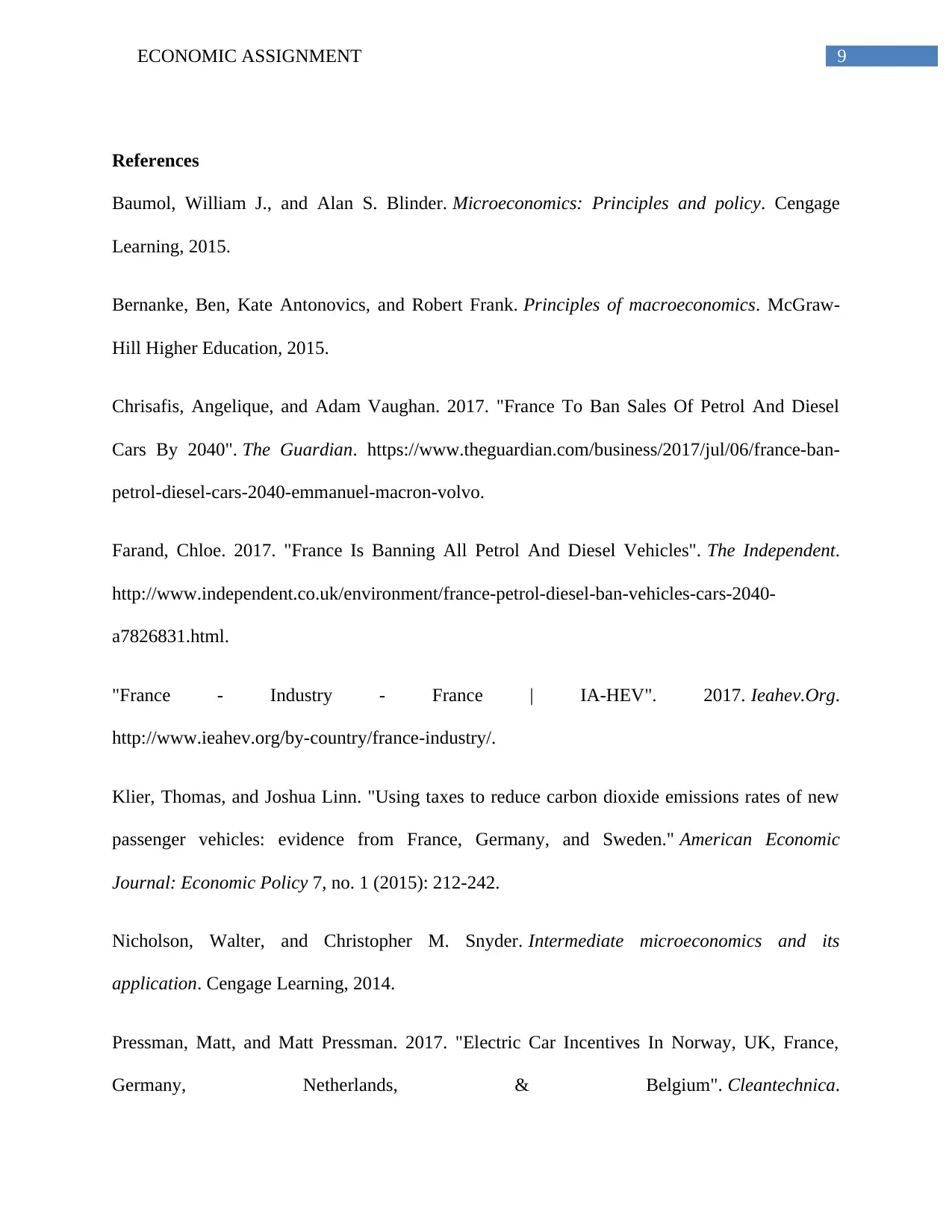
9ECONOMIC ASSIGNMENT
References
Baumol, William J., and Alan S. Blinder. Microeconomics: Principles and policy. Cengage
Learning, 2015.
Bernanke, Ben, Kate Antonovics, and Robert Frank. Principles of macroeconomics. McGraw-
Hill Higher Education, 2015.
Chrisafis, Angelique, and Adam Vaughan. 2017. "France To Ban Sales Of Petrol And Diesel
Cars By 2040". The Guardian. https://www.theguardian.com/business/2017/jul/06/france-ban-
petrol-diesel-cars-2040-emmanuel-macron-volvo.
Farand, Chloe. 2017. "France Is Banning All Petrol And Diesel Vehicles". The Independent.
http://www.independent.co.uk/environment/france-petrol-diesel-ban-vehicles-cars-2040-
a7826831.html.
"France - Industry - France | IA-HEV". 2017. Ieahev.Org.
http://www.ieahev.org/by-country/france-industry/.
Klier, Thomas, and Joshua Linn. "Using taxes to reduce carbon dioxide emissions rates of new
passenger vehicles: evidence from France, Germany, and Sweden." American Economic
Journal: Economic Policy 7, no. 1 (2015): 212-242.
Nicholson, Walter, and Christopher M. Snyder. Intermediate microeconomics and its
application. Cengage Learning, 2014.
Pressman, Matt, and Matt Pressman. 2017. "Electric Car Incentives In Norway, UK, France,
Germany, Netherlands, & Belgium". Cleantechnica.
References
Baumol, William J., and Alan S. Blinder. Microeconomics: Principles and policy. Cengage
Learning, 2015.
Bernanke, Ben, Kate Antonovics, and Robert Frank. Principles of macroeconomics. McGraw-
Hill Higher Education, 2015.
Chrisafis, Angelique, and Adam Vaughan. 2017. "France To Ban Sales Of Petrol And Diesel
Cars By 2040". The Guardian. https://www.theguardian.com/business/2017/jul/06/france-ban-
petrol-diesel-cars-2040-emmanuel-macron-volvo.
Farand, Chloe. 2017. "France Is Banning All Petrol And Diesel Vehicles". The Independent.
http://www.independent.co.uk/environment/france-petrol-diesel-ban-vehicles-cars-2040-
a7826831.html.
"France - Industry - France | IA-HEV". 2017. Ieahev.Org.
http://www.ieahev.org/by-country/france-industry/.
Klier, Thomas, and Joshua Linn. "Using taxes to reduce carbon dioxide emissions rates of new
passenger vehicles: evidence from France, Germany, and Sweden." American Economic
Journal: Economic Policy 7, no. 1 (2015): 212-242.
Nicholson, Walter, and Christopher M. Snyder. Intermediate microeconomics and its
application. Cengage Learning, 2014.
Pressman, Matt, and Matt Pressman. 2017. "Electric Car Incentives In Norway, UK, France,
Germany, Netherlands, & Belgium". Cleantechnica.
Paraphrase This Document
Need a fresh take? Get an instant paraphrase of this document with our AI Paraphraser
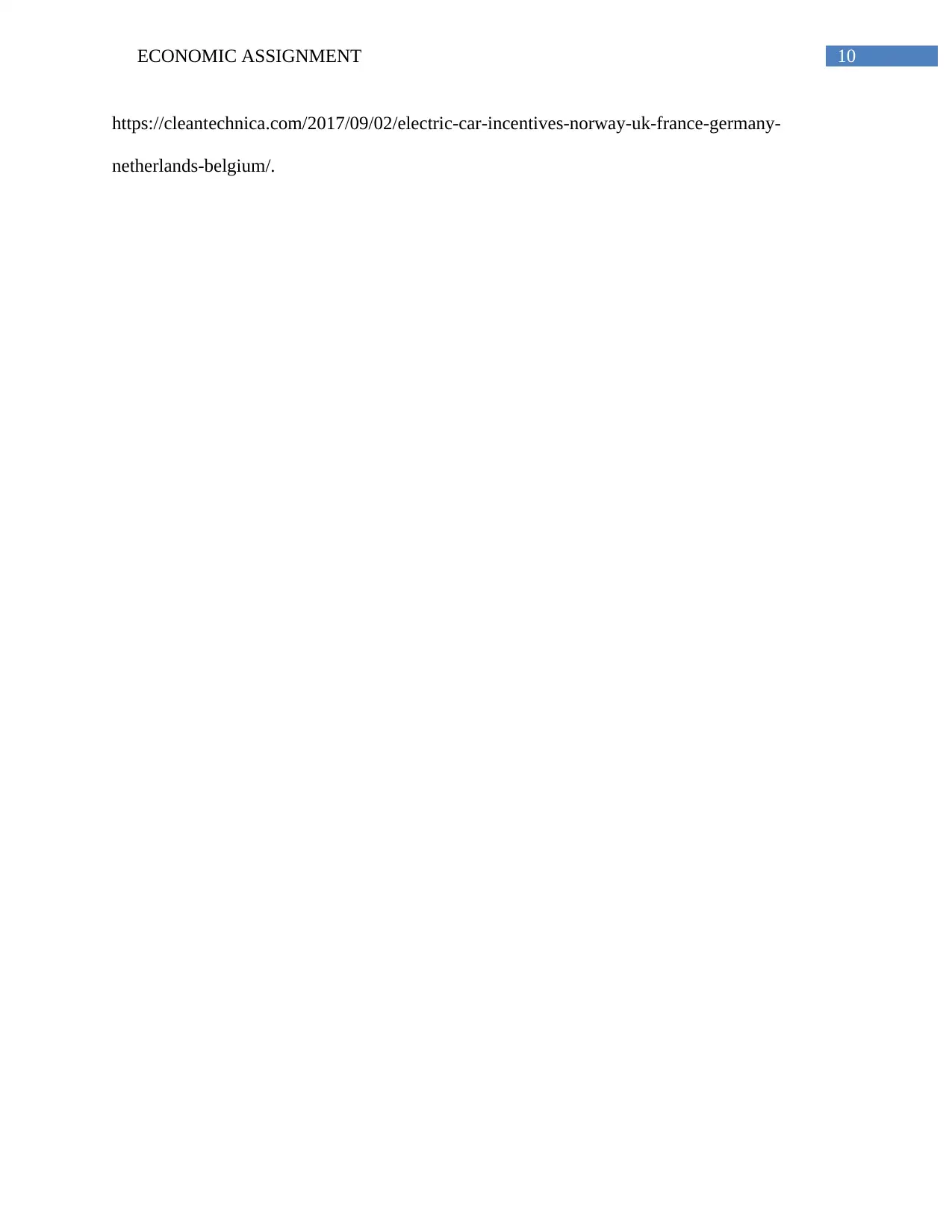
10ECONOMIC ASSIGNMENT
https://cleantechnica.com/2017/09/02/electric-car-incentives-norway-uk-france-germany-
netherlands-belgium/.
https://cleantechnica.com/2017/09/02/electric-car-incentives-norway-uk-france-germany-
netherlands-belgium/.
1 out of 11
Related Documents
Your All-in-One AI-Powered Toolkit for Academic Success.
+13062052269
info@desklib.com
Available 24*7 on WhatsApp / Email
![[object Object]](/_next/static/media/star-bottom.7253800d.svg)
Unlock your academic potential
Copyright © 2020–2026 A2Z Services. All Rights Reserved. Developed and managed by ZUCOL.





